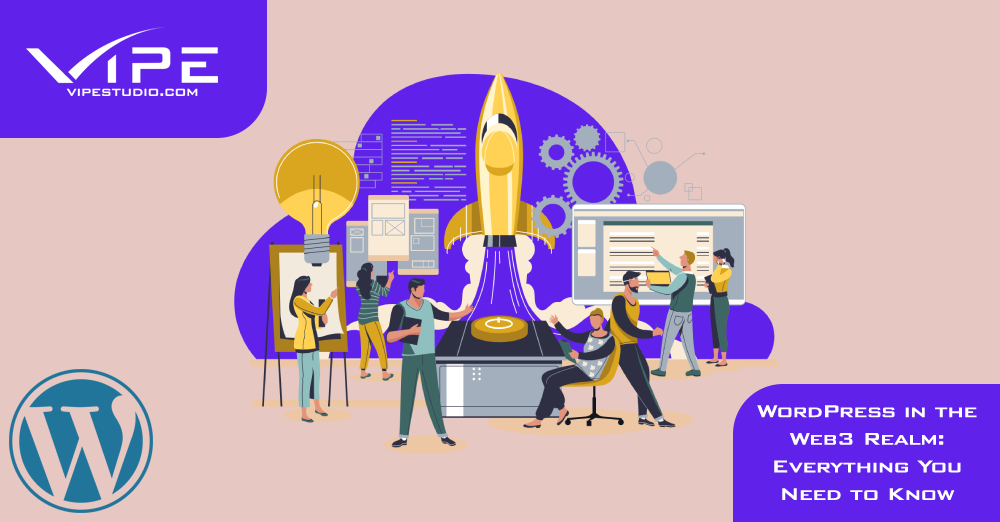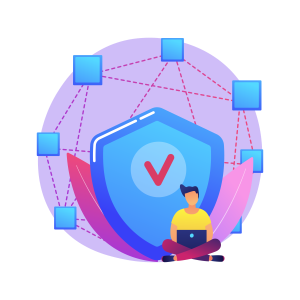11.05.2022
WordPress Development
WordPress in the Web3 Realm: Everything You Need to Know
READING TIME: MIN
Table of Content
The web development world is an ever-evolving industry, and as such, there are always emerging trends that promise to change the digital landscape. More often than not, the beginning and end of every year are marked by discussions and debates surrounding the state of the IT sector and the future directions it is headed towards.
Our WordPress agency for enterprise knows that most of the time, the same trends are being featured in publications all around the web, which can annoy readers due to the constant repetition of concepts. However, we want to remind you that this consistent reiteration demonstrates that the respective trends have the potential to mature and have a real impact on the industry.
And what is one major trend that is featured in literally every listicle that discusses web development trends? The rise of Web 3.0. Everyone is talking about Web3 right now, but what does that mean? We probably don’t need to tell you that any trend should be taken with a grain of salt. After all, a trend can succeed, but it may also fail spectacularly.
When it comes to Web 3.0, however, our enterprise WordPress agency believes there is a lot to uncover because this so-called trend has already had an impact on our lives, even if many of us are unaware of it.
So, roll up your sleeves, put your futuristic sunglasses on, and let us take you on a journey through the Web3 realm to see how WordPress fits into it and how it will (potentially) transform the web development world. Ready? Let’s go!

A Brief History of the Web
While we’re waiting to see whether Web 3.0 will thrive or flop, it’s probably a good idea to refresh our knowledge and take a look back at Web 1.0 (the beginning phase of the Internet) and Web 2.0 (the phase some argue has already ended while others believe we’re still in).
Here are the most important things about Web 1.0, Web 2.0, and Web 3.0 that our WordPress Agency for Development wants you to remember.

Web 1.0
Web 1.0 is also known as the read-only Internet. Back in the day, Web 1.0 used a static format to make information available to the general public.
However, Web 1.0 had one significant drawback, and that was the fact that only tech geeks and IT corporations had the competence and ability to create content. This, of course, was a major issue. Publishing to the web during Web 1.0 necessitated a high level of technical expertise and a thorough understanding of coding.

Web 2.0
Web 2.0 is referred to as the read-write web. The Internet basically grew more participatory, allowing for the rise of social networks and user-generated content. Our WordPress development agency reminds you that making your voice heard on the web is now easier than ever.
Yet, for many, this resulted in an unsettling centralization and ownership of user data with the content being clutched in the hands of large corporations for the most part. Critics often condemn the Web 2.0 model because they fear users have turned into nothing more than a product that is being exchanged for the services we adopt and use every day.
One of the most prominent problems associated with Web 2.0 is the concern that creators receive little to no compensation for the overall value they provide.
By the way, did you know that WordPress revolutionised Web 2.0? Our WordPress development company has always liked WP’s objective, which is to “democratise publishing”.
This very vision was essential in ushering in Web 2.0 by providing creators more ownership and control over their data, content, and code. However, issues such as centralization, censorship, governance, privacy, trust, and financing remain unsolved.

Web 3.0
Web 3.0 (sometimes called the Semantic Web), refers to an enhanced, customised, secure, and decentralised Internet. Our WordPress agency for enterprise wants you to remember that the most important thing about the new web is that it is built on blockchain networks. These are innovative methods of storing data that are basically impenetrable to hackers.
Here are a few of the main characteristics that define Web 3.0:
- Decentralised: Your data is decentralised, which means that no single entity has power over it.
- Permissionless: Anyone who is connected to the network has the authorization to utilise the service.
- Uncensorable: Data recorded in the blockchain cannot be edited or altered in any way.
- Monetization: The ability to conduct frictionless financial transactions is built in. Creators can be rewarded without the need for an intermediary.
- Privacy: Identity is linked to cryptographic keys, which ensures privacy. Anonymity is a possibility.
Web3 in Terms of Web Development
The introduction of Blockchain and Smart Contracts is changing the web development landscape.
Our enterprise WordPress agency reminds you that thanks to these technologies, it is now feasible to create decentralised apps that allow anybody to join without selling their personal data.
Decentralised apps make frictionless financial transactions (Cryptocurrency & DeFi) possible. DAOs give governance in a way that is open and transparent.
Original works of art can be minted on the blockchain (NFTs) to provide creators with new opportunities to monetise their work and create new trading markets.
The new Web 3.0 aims to rid governments and tech companies of their power to interfere in commerce and censor speech on the Internet. Web3 transforms trust into a decentralised and programmatic thing.
Our WordPress Agency for Development doesn’t believe in sugar-coating anything, so it’s worth noting that Web 3.0 has several constraints, such as scalability, user experience, and cost. However, these issues are rapidly being addressed, and it is now feasible to create practical and effective apps using this technology.

Promising Features of Web 3.0 That Can Benefit WordPress Website Development
And so, it is clear that Web 3.0 and blockchain technologies are still in their infancy, and there is plenty of space for refinement. In a nutshell, though, Web 3.0 aims to address some of the issues that afflicted Web 2.0.
We can clearly see that it’s not all black and white. Web3 has several positive aspects and some negative ones, so it’s not that different from the web of today, at least in that regard. Our WordPress development agency can’t say for sure whether Web 3.0 will truly transform how we consume Internet services, but one thing is certain – we should always strive toward innovation in order to create something greater.
Web3 centres around the enhanced user experience, meaning that professional WordPress website development is changing too to meet the demands of the new web landscape. Let’s take a look at some of the problems that Web 3.0 claims to tackle that can actually benefit the way we build sites with WordPress.

Decentralised Format
Facebook, Apple, Twitter, Google, Amazon, and other large tech businesses grew at an exponential rate throughout the Web 2.0 era. These companies have made a name for themselves by developing memorable services and products, and no one can take that away from them. However, more and more allegations are being made about these organisations’ practices.
Our WordPress development company knows that there is a heated discussion over these corporations’ monopolies and how they treat competitors unjustly. This is beyond the scope of this article, but there are some clear signs that big corporations have amassed too much influence.
Web 3.0 advocates for a decentralised Internet format that would reduce the power of large corporations. Of course, that doesn’t imply the large tech businesses will go away – it’s just another step toward a more open and free environment.
Blockchain technology is all about the community making decisions for themselves, instead of leaving that power in the hands of gigantic corporations. If Web3 ever becomes a full-fledged reality, we can expect to see users voting on the blockchain’s agenda and major choices.

Our WordPress agency for enterprise knows for a fact that there are many proponents of the idea of using WordPress’ large install base to provide distributed services to everyone. For instance, some years ago, WordPress core developer, Gary Pendergast, proposed a concept called “Connected WordPress” that would accomplish just that.
In his own words, the concept didn’t catch on at the time, but the DNA of the Connected WordPress notion has many of the same characteristics as the decentralised structure of Web3. However, in his blog post, “WordPress and web3”, Pendergast said that we must accept that centralization has definite advantages that can’t be overlooked.
Our enterprise WordPress agency believes that Pendergast asked a very important question, namely – if centralised services are required to play fairly with self-hosted sites and as long as individuals have the freedom to pick how and where they participate, is there a practical difference between Web 2.0 and what Web 3.0 is trying to achieve?
As you can see for yourself, there’s a lot of food for thought regarding the decentralised format proposed by Web3.
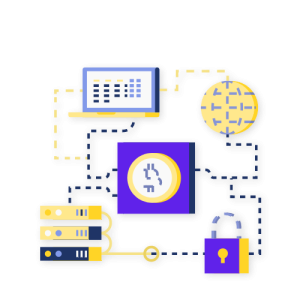
Security
When it comes to professional WordPress website development, security has always been a top priority for businesses of all shapes and sizes and especially for large-scale enterprise organisations. After all, no business owner wants to see their website hacked.
Anybody who intends to hack an app or website must first gain access to the server hosting the files. A weak password or malicious code are some possibilities for gaining access. The ultimate aim, though, is to obtain access to the server.
A major benefit of blockchain technology is that it eliminates the need for a server to store an app’s or website’s infrastructure.
To hack a blockchain service, a cybercriminal would require access to additional network participants. However, even for the most competent hackers, this is a near-impossible endeavour given the big number of participants.
Because of the enhanced security that blockchain provides, our WordPress Agency for Development believes this technology can aid the creation of safer, more trustworthy websites and apps.
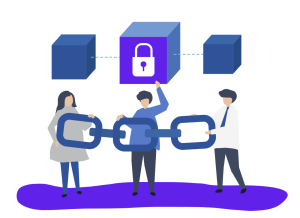
Fair Financial Compensation
It is a known fact that big tech companies make tremendous sums of money from their audiences, but users are not compensated in any way. This is something that many people take for granted and don’t question at all but others deem it quite unfair for social media giants to be earning millions for displaying ads in users’ feeds.
Here comes Web 3.0, which aims to tokenize online experiences. Apps and websites that employ blockchain technology allow users to be rewarded with tokens (virtual coins). Furthermore, Web3 makes it possible to invest money in thousands of projects and earn digital coins.
However, our WordPress development agency warns you not to get too excited, at least for now. It is clear that playing games on the web won’t make you rich (unless, of course, you’re a pro gamer but we don’t mean “playing games” in that context). Still, Web 3.0 is a huge step toward making money from your online activities. Play-to-earn games, for example, are built on blockchain and offer to reward players.
If you want to imbue this fair financial philosophy into your WordPress website, then blockchain technology might be the right thing for you.
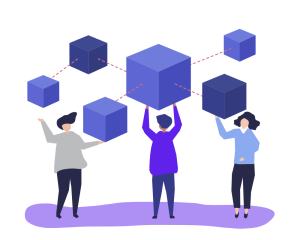
Genuine Privacy
One of our favourite aspects of Web 3.0 is its dedication to privacy. The new web is truly concerned about your privacy and that is obviously a good thing.
Blockchain technology can be truly beneficial for WordPress website development because it lets you access services and goods without the need for your personal data. In the Web3 realm, your identity is practically hidden – you’re simply another anonymous block in a massive sea of anonymous blocks.

Autonomous Governance
Our WordPress development company believes that, in the coming years, the term “decentralised autonomous organisation” (DAO) will become considerably more common.
Put simply, DAOs aim to change your status from “user” to “participant”. Remember that users can be viewed as mostly passive, while participants are characterised by being active.
DAOs aren’t only a way to establish a community; they’re also a new way of doing business. This model involves active participation by all members of a self-governing organisation.
A DAO-based business is more transparent, has more active participants, and is less structured. If more and more enterprises adopt this new business model, the way we approach WordPress website development will inevitably evolve too in order to meet the new demands of organisations.
After all, a DAO-based business will require a DAO-based website, which will be built and structured in a way that’s probably different from what we do now.
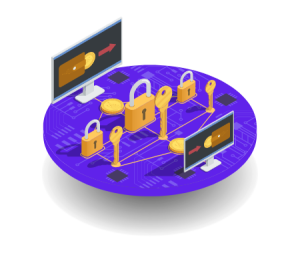
Experiments Exploring Web3 and WordPress
Now, our WordPress agency for enterprise wants to bring your attention to Web3 WP – a group of enthusiasts and businesses devoted to introducing the WordPress community to the decentralised future of the Internet.
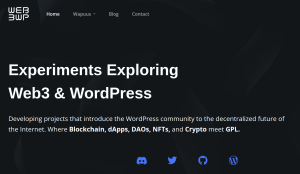
The Web3 WP community acknowledges that Web3 technologies can be divisive, but they believe that the new capabilities Web3 unlocks can certainly be viewed as the Internet’s future.
With that being said, let’s see the interesting experiments of Web3 WP!
The Wapuu NFT Collection
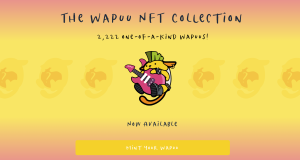
Our enterprise WordPress agency reminds you that Wapuu is WordPress’ adorable, open-source, and (un)official mascot. Wapuu swag is usually collected at WordCamps around the globe.
Web3 WP went a step further by creating a generative art project with 2,222 distinct Wapuus that can be minted as an NFT and can be traded on the Ethereum blockchain by the WordPress community.
Web3 WP created a programmed generator that produces fully unique Wapuu characters from a random collection of over one hundred diverse attributes such as hair, headwear, accessories, attire, holding items, and colours.
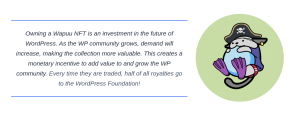
What our WordPress Agency for Development finds most interesting about this project is that Wapuu traits are weighted to have varying rarity; some are quite prevalent, while others are only seen on a select few Wapuus.
You may acquire a Wapuu with a common or unusual mix of traits when you mint it. As a result, the rarer Wapuus are more collectable and lucrative on the open market. You can check out the Wapuu NFT Collection HERE.
The Collectable “WordPress Core Contributor” Coins
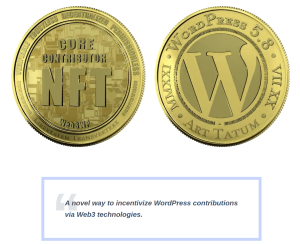
Following the footsteps of the Wapuu NFT Collection, Web3 WP is now working on another collectable NFT WordPress swag.
The idea behind this project is to support WordPress by rewarding core contributors for their past and future efforts.
Our WordPress development agency was curious to find out that Web3 WP is making limited-edition collectable “WordPress Core Contributor” coins for each of WordPress’ 41 major historical releases, dating back to version 0.7.
Instead of minting and distributing these collectable coins in the real world through postal services or at events like WordCamps, the team behind Web3 WP will use Web3 to create NFTs (Non-Fungible Tokens).
These NFTs are basically distributed as an “Airdrop”, as only WordPress Core Contributors may claim and mint them for free.
The folks from Web3 WP envision several possible outcomes from this NFT experiment, all of which might help them achieve their aim of growing and improving the WordPress project. Our WordPress development company salutes their efforts and dedication! You can read more about their project HERE.
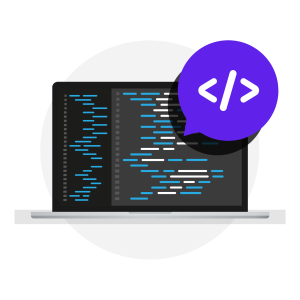
How to Prepare for Web 3.0?
Facebook recently rebranded itself as Meta, indicating that Web 3.0 is rapidly approaching. Of course, the technologies associated with Web3 are still in their infancy, and we’ll see plenty of changes in the future.
However, it is probably a good idea to prepare for those changes. Whether you are an entrepreneur, content creator, developer, or hobbyist, you can spend some time learning about blockchain technology and other Web 3.0 ideas.
Our WordPress agency for enterprise believes that if Web 3.0 ever becomes a reality, being an early adopter of the new technologies will provide you with a strategic edge. We advise you to begin by becoming familiar with the fundamentals of blockchain technology.
Next, look at the documentation on the Bitcoin and Ethereum websites. This will help you learn more about blockchain and how to use it in terms of WordPress website development.

Is WordPress Ready for Web3?
This article merely touches the surface of Web 3.0, which is only natural, given the enormous scope of the topic at hand. Web3 is evolving every single day and it’s kind of hard to keep up with everything going on. However, if you want to stay relevant, you better keep track of the latest news surrounding Web3.
And what about WordPress and its place within the Web3 realm? Our enterprise WordPress agency reminds you that before blockchain technology became the main characteristic of the new web, Web 3.0 was more widely associated with the concept of the Semantic Web.
The Semantic Web is better aligned with WordPress’ ideals while also meeting many of the current Web3’s objectives. Remember that WordPress is a major driving force of the Open Web, and as such, it has already helped millions of people sustainably own their content.
Blockchain apart, our WordPress Agency for Development can say that WordPress has actually been living in the Web3 realm for a while now. After all, isn’t this the very platform that allows users to communicate with others on their own terms and build communities that aren’t reliant on large corporations or proprietary tech solutions?
Whatever the future holds, we are sure that WordPress and its community will be ready to evolve alongside it while at the same time remaining at the top of the CMS market.
More on The Topic
- The Role of AI in WordPress Development Workflows
- Optimizing WordPress for Enterprise: Beyond Basic Caching
- WordPress and Headless Commerce: A Provocative Dilemma
- Decoupled WordPress Architecture: The Future or a Fad?
- Rethinking WordPress Security: Lessons from Real Breaches
Tags: blockchainblockchain technologyblockchain transactionsblockchain transactions in WordPressBlockchain WordPressdecentralizationNFTprivacysecuritytrendsWeb 3.0web developmentWeb3WordPress Web3
The content of this website is copyrighted and protected by Creative Commons 4.0.


